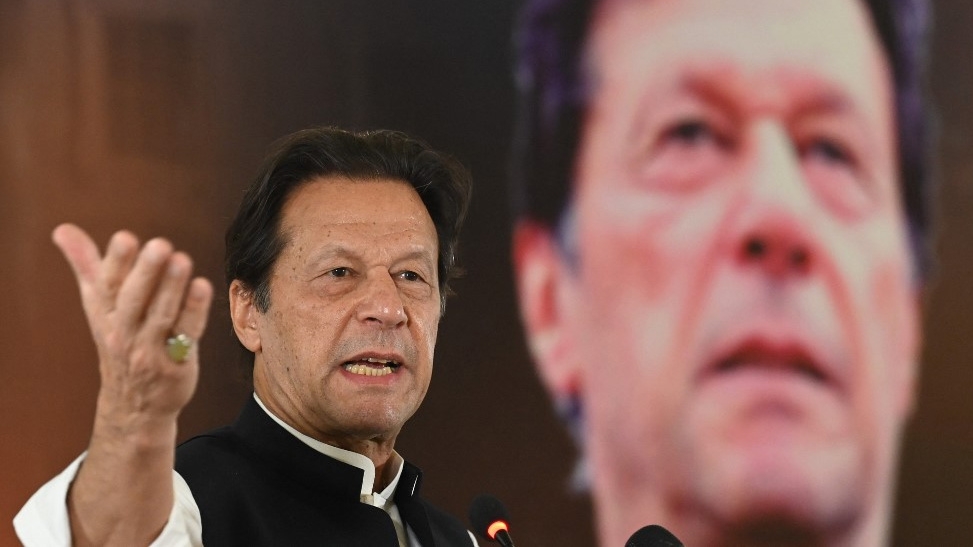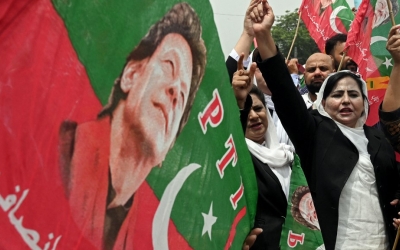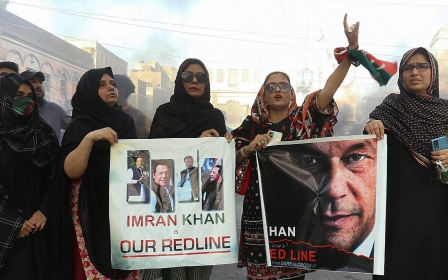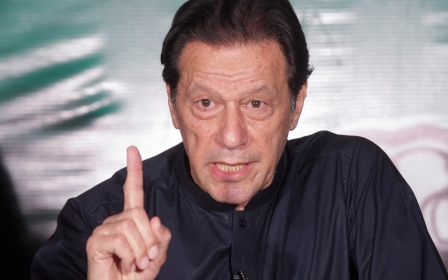Pakistan: Imran Khan faces the wrath of the state

Former Pakistani Prime Minister Imran Khan’s political standoff with the country’s powerful military establishment has entered a new stage, as he was handed two separate jail sentences this week - one for 14 years and one for 10 - on charges of corruption and leaking state secrets.
The former foreign minister, Shah Mehmood Qureshi, an aide to Khan, was also given a 10-year sentence in the state secrets case, which revolved around the publication of a confidential diplomatic “cypher” sent by Pakistan’s ambassador to the United States.
Last August, Khan was sentenced to three years in another corruption case, but an appeals court subsequently suspended the conviction.
Many have questioned the authenticity of the series of charges lodged against Khan, along with the fairness of his trials, which have been been marred by the harassment of his legal team.
It is expected that Khan will eventually be exonerated of all charges, but there is clearly a strategy at play to gradually create a ring of criminal cases around him, so that even if his lawyers manage to overturn some, he remains mired in others.
New MEE newsletter: Jerusalem Dispatch
Sign up to get the latest insights and analysis on Israel-Palestine, alongside Turkey Unpacked and other MEE newsletters
This highlights the political realities on the ground in Pakistan, where Khan and his party remain popular and politically relevant. Khan’s removal from power in April 2022 only helped his political cause. His resilience in the face of adversity, rather than the typical move of cutting a political deal and leaving the country, has elevated him among voters to a larger-than-life figure.
Meanwhile, the abject failure of Khan’s successor to provide the country with economic relief from massive inflation, didn’t help the anti-Khan cause. The ongoing repression of his supporters has also increased sympathy for the former prime minister, even among constituencies that might have opposed his policies.
Khan versus the military
At the structural level, the wave of support for Khan has major implications for Pakistan’s premium power stakeholder: the military. Instead of blaming his removal from power on his political opponents, Khan said the military, backed by the US, was responsible for his downfall.
Khan’s argument was based on the contents of the cypher at the heart of the state secrets case, in which a US official allegedly raised concerns with the Pakistanis about Khan visiting Russia - an issue that complicated bilateral ties.
This ultimately made the military a core player in the political saga, with Khan as a political force coming up against the country’s army. Khan’s arrest last year made it even clearer that his politics and narrative posed a structural challenge to the military’s role, perks and privileges.
Khan's mere existence, even inside a prison cell, has been enough to keep his followers rejuvenated and his political party relevant
Khan’s journey from being a political ally of the military to an existential challenge to its institutional power, has meant that any potential future Khan government would likely need to establish civilian supremacy over the army, effectively rolling back its influence in politics.
Like former Pakistani leader Zulfikar Ali Bhutto, who was able to rein in the military to a degree in the wake of the 1971 war, Khan has emerged as another such figurehead, with the political will, but also considerable political support, to contain the army. This would transform not only the country’s political culture, but also its internal and external policymaking contours.
All of these factors have contributed to Khan becoming persona non grata in Pakistan’s political scene. He will never be allowed by the military to return to power.
But Khan’s mere existence, even inside a prison cell, has been enough to keep his followers rejuvenated and his political party relevant. Despite expectations to the contrary, his Pakistan Tehreek-e-Insaf (PTI) party has not vanished, as members have refused to bend to pressure and desert the party. Instead, they have opted to face political repression.
Persistent support
This has culminated in a situation where resilience has been demonstrated not only by Khan and a few of his party’s top-tier leaders, but also by the party’s middle- and lower-tier cadres.
Their support has persisted even in the run-up to elections, where the PTI and its candidates have faced a plethora of challenges from the government to limit their chances to get elected. The party’s electoral symbol has been banned, the nomination papers of its candidates have been rejected, and candidates have been subjected to arrests and harassment, while their competitors have been allowed to canvass with ease.
Moreover, the party and its leadership have witnessed near-total censorship across local media, and even the social-media space has been disrupted. The administration’s intimidation tactics have been repeatedly brought to the attention of judicial authorities, but the recourse has been severely limited.
This underscores the compromised state of the country’s judicial integrity, something further highlighted by the recent resignations of top judges.
Khan’s recent sentencing will probably not be the last one. He may face fresh indictments. But the timing of the latest verdicts has been carefully choreographed to weaken the resolve of his voter base on election day, along with their will to challenge any possible electoral irregularities.
The forces arrayed against Khan understand that such a long sentence could convince a fraction of Khan’s voter base of the futility of sticking with him - even as Khan and his party, against all odds, continue to remain a political force to be reckoned with.
The jury is still out, but in light of the political developments of the past two years, the Khan juggernaut probably marks the toughest challenge faced by the Pakistani state apparatus in its modern history.
The views expressed in this article belong to the author and do not necessarily reflect the editorial policy of Middle East Eye.
Middle East Eye delivers independent and unrivalled coverage and analysis of the Middle East, North Africa and beyond. To learn more about republishing this content and the associated fees, please fill out this form. More about MEE can be found here.






